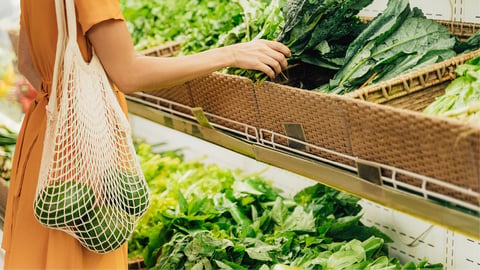How Real Canadian Superstore’s Jonathan Carroll Takes the Lead
In Canadian Grocer’s new series, we’ll speak to people from across the industry about a specific project or initiative they led. You’ll hear from grocery leaders about their passions, how they tackle challenges, what they’ve learned and what keeps them motivated. Have a pitch? Send it to digital editor Jillian Morgan.
Jonathan Carroll has been with Loblaw Companies for 15 years, where he is SVP of operations for Real Canadian Superstore. In addition to traveling across Canada in this capacity – and becoming a champion of local products – Carroll has taken on a project that is significant not only for the entire company, but communities, suppliers, consumers and the planet: food waste reduction.
“Our purpose at Loblaw is to help ‘Canadians Live Life Well,’” says Carroll, chair of Loblaw's Food Waste Reduction Committee. “Driven by this purpose, our approach to addressing ESG is focused on two priorities: fighting climate change and advancing social equity.”
READ: Loblaw grocery brands partner with food recovery programs
Food waste is a significant contributor to greenhouse gas emissions and prevents healthy meals from reaching people facing food insecurity. Here, Carroll talks about taking the lead on food waste.
Tell us about the goal behind Loblaw’s food waste reduction efforts
As a company, our goal is to send zero food waste to landfill by 2030. This goal extends to our full enterprise, including franchise and associate-owned store operations, as well as our supply chain.
What is a change the company has made towards this goal?
We have long-standing partnerships with organizations like Food Banks Canada, Food Banks of Quebec and Second Harvest to help with our giving efforts. We have increased our support for food recovery programs across Canada, working with more partners in our communities to ensure edible food is donated to people in need. We’re also forming new and innovative partnerships with organizations such as Flashfood and Loop Resource. Flashfood is an app that connects consumers with great deals on groceries in surplus or nearing their best-before dates. Loop sends food not fit for human consumption to farms across Canada and to make animal feed and compost. And lastly, we partner with ZooShare, a biogas company in the Greater Toronto Area that transforms oil and other inedible products from our stores into electricity for the grid. To make the most of our partnerships, we leverage their expertise to implement effective food waste diversion strategies.
READ: Loblaw, Flashfood mark milestone in partnership to reduce food waste
What did this project need to get right from the start?
We have four areas of focus: engage and inspire our colleagues; data and reporting; drive donations; and supply chain. To engage and inspire our employees, we wanted to make them active participants in our mission, to inspire them to take a personal interest in reducing food waste in their community. To do this, we organized live training and education sessions with our donation partners Second Harvest, Food Banks Canada and Food Banks of Quebec. In 2023, we also created an e-learning module to educate colleagues on in-store practices including donation best practices and our various food waste diversion programs. We also knew that data and reporting would be paramount to our success. We established a tracking system to help us monitor and report our progress. The data can help us identify what's working and what needs improvement. This includes a food waste dashboard to help us track scrapping diversion and disposal rates at each store. To drive donations, in 2022, 100% of our eligible stores and distribution centres were matched with a local food bank or food recovery agency. When it comes to supply chain, we knew we needed to reduce excess inventory. That’s why we’ve adopted a proactive upstream mitigation approach which involves the implementation of an advanced inventory management ecosystem to enhance forecasting accuracy, improve visibility and reduce lead times from vendors to customers.
READ: Loblaw commits to donate one billion pounds of food by 2028
What achievements has Loblaw reached so far?
In 2022, we donated more than 6.8 million kilograms of food to our partners, Second Harvest, Food Banks Canada and Food Banks of Quebec. We leveraged new methods to not only reduce food waste, but also created additional revenue streams by partnering with Flashfood, which is live in over 720 of our stores. In 2022 alone, we eliminated more than 9.4 million kilograms of potential food waste together. Since launching in 2019, our partnership with Flashfood has already diverted more than 40 million lbs. of potential food waste and saved Canadians over $110 million on their grocery bills. In 2022, with Loop Resource, about 100 participating stores nationwide sent 17.7 million kilograms of food not fit for human consumption to more than 2,100 farms for animal feed and compost. Through the 10x20x30 initiatives, the world’s largest food retailers and suppliers sign on for the UN SDG Target 12.3 to halve global food waste by 2030. Through this initiative, Loblaw has on-boarded 15 partners as of 2022.
READ: Loblaw releases 2022 ESG report
A project like this involves a lot of collaboration. How did you approach it?
We started with an executive-led working group to support our efforts. We then established clear objectives for our various food waste reduction projects. These objectives were communicated to by all departments and teams involved. It was crucial that everyone understood the ultimate goal and how their contributions would make an impact. We then formed cross-functional teams that brought together individuals from various departments. Four workstreams have been identified – Maximize Donations, Supply Chain, Data & Reporting and Shrink & Scrapping – and are led by key leaders from all areas of the business.
What mantras have guided you in your work?
In retail, you need to constantly challenge yourself and your team to always do better the following year. There are seasons within seasons, and you need to set targets and goals to build future growth. Retail is always changing, so you can never do the same thing twice and are always adapting. Lastly, learn from your team and share the wisdom – we meet as a discount division once a quarter and share best practices to help support future growth. My retail family is everything. In Superstore, our mantra is People, Purpose and Passion. People are always first because if you don’t have the right team, you’re not going to win Purpose and Passion.
READ: Loblaw partners with Food Banks Canada to provide $175K in funding to Indigenous organizations
What does it take to get a big project from start to finish and achieve all the steps in between?
Hands-on involvement at each step of the process is important. It means individuals and teams from various departments and areas of expertise actively engage in every phase of the project. You're not just relying on one group's expertise – you're drawing on the strengths and insights of your entire retail family.
What do you do outside the office that helps you be a better leader at work?
My family grounds me, watching my kids in university, start their first job and grow up is amazing. My wife is the lifeline in my family. Imagine asking your wife to move over 15 times in your career; retail is very much like the military. We all stick together and support each other in our development.
Catch this interview with Carroll in Canadian Grocer's December/January 2023 issue.



